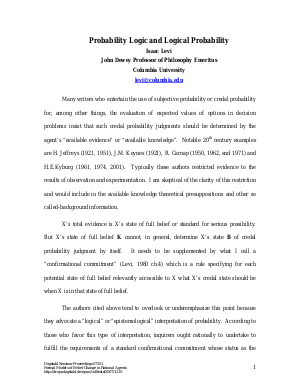Probability Logic and Logical Probability
Author Isaac Levi
-
Part of:
Volume:
Dagstuhl Seminar Proceedings, Volume 7351
Part of: Series: Dagstuhl Seminar Proceedings (DagSemProc) - License:
 Creative Commons Attribution 4.0 International license
Creative Commons Attribution 4.0 International license
- Publication Date: 2007-11-20
File

PDF
DagSemProc.07351.17.pdf
- Filesize: 110 kB
- 27 pages
Document Identifiers
Subject Classification
Keywords
- Probability
- full belief
- logic
- evidence
Metrics
- Access Statistics
-
Total Accesses (updated on a weekly basis)
0Document
0Metadata
Abstract
Authors like Keynes, H. Jeffreys and Carnap advocated using a concept of "logical probability". Logical probability had the following properties: (a) it was representable as a function from potential states of full belief (or "evidence") to states of subjective or credal probability judgment. (b) Such functions were alleged to be constrained by principles of probability logic. (c) All rational agents were supposed to be obliged to adopt the standard function that probability logic prescribed. In this essay, it is argued that these three requirements could be satisfied only if probability logic prescribed that credal probability should be numerically determinate. Keynes denied that it should numerically determinate and Carnap abandoned the idea that probability logic could supply a determinate function from states of full belief to numerically determinate credal states that all rational agents ought to adopt. The paper explains that once this is conceded, logical probability ought to be interpreted rather differently than it is customarily is.
Cite As Get BibTex
Isaac Levi. Probability Logic and Logical Probability. In Formal Models of Belief Change in Rational Agents. Dagstuhl Seminar Proceedings, Volume 7351, pp. 1-27, Schloss Dagstuhl – Leibniz-Zentrum für Informatik (2007)
https://doi.org/10.4230/DagSemProc.07351.17
BibTex
@InProceedings{levi:DagSemProc.07351.17,
author = {Levi, Isaac},
title = {{Probability Logic and Logical Probability}},
booktitle = {Formal Models of Belief Change in Rational Agents},
pages = {1--27},
series = {Dagstuhl Seminar Proceedings (DagSemProc)},
ISSN = {1862-4405},
year = {2007},
volume = {7351},
editor = {Giacomo Bonanno and James Delgrande and J\'{e}r\^{o}me Lang and Hans Rott},
publisher = {Schloss Dagstuhl -- Leibniz-Zentrum f{\"u}r Informatik},
address = {Dagstuhl, Germany},
URL = {https://drops.dagstuhl.de/entities/document/10.4230/DagSemProc.07351.17},
URN = {urn:nbn:de:0030-drops-12105},
doi = {10.4230/DagSemProc.07351.17},
annote = {Keywords: Probability, full belief, logic, evidence}
}
